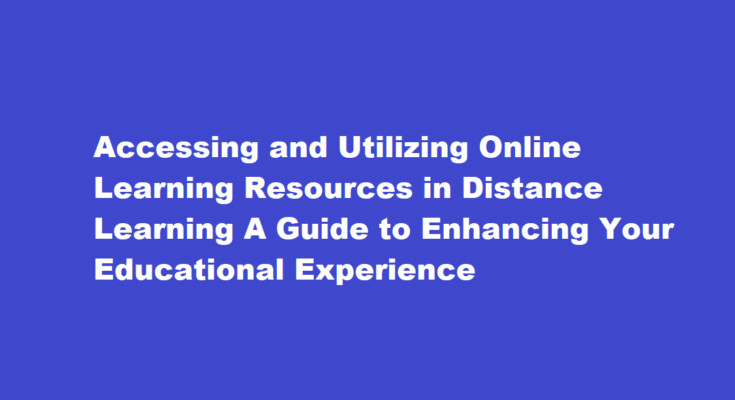Introduction
In distance learning, access to a wide range of online learning resources is essential for academic success. From digital libraries to educational websites, leveraging these resources can enhance your educational experience and deepen your understanding of course materials. In this article, we will explore practical strategies for accessing and utilizing online learning resources effectively in the distance learning environment.
Familiarize Yourself with Available Resources
- Start by exploring the online learning resources provided by your institution. These may include digital libraries, databases, research portals, and learning management systems. Take the time to familiarize yourself with these platforms, understand their features, and discover the resources they offer.
Utilize Digital Libraries and Databases
- Digital libraries and databases provide a wealth of scholarly resources, including e-books, academic journals, articles, and research papers. Access these resources through your institution’s library website or other reputable online library platforms. Learn how to search effectively, filter results, and navigate these databases to find relevant and reliable sources.
Seek Open Educational Resources (OERs)
- Open Educational Resources (OERs) are freely accessible learning materials that can supplement or replace traditional textbooks. OERs include textbooks, lecture notes, videos, and interactive learning modules. Explore OER repositories and websites that offer high-quality educational content, such as OpenStax, OER Commons, and Khan Academy.
Engage with Educational Websites and Platforms
- Take advantage of educational websites and platforms that offer interactive learning experiences. These resources often provide tutorials, quizzes, and exercises to reinforce your understanding of various subjects. Platforms like Coursera, Udemy, and Khan Academy offer a wide range of courses and resources across different disciplines.
Join Online Discussion Forums and Communities
- Engage in online discussion forums and communities related to your field of study. These platforms allow you to connect with fellow learners, ask questions, share insights, and collaborate on projects. Participating in these communities can expand your network and provide additional learning resources and support.
Follow Reputable Blogs and Educational Channels
- Identify reputable blogs and educational channels relevant to your area of study. Many experts and educators share valuable insights, tips, and resources through blogs, YouTube channels, and podcasts. Subscribe to these sources to stay updated and access additional educational content beyond your course materials.
Evaluate the Credibility of Online Sources
- As you navigate online learning resources, it’s crucial to evaluate the credibility and reliability of the sources. Consider the author’s expertise, publication date, supporting references, and reputation of the platform. Avoid relying solely on unverified or biased sources and prioritize peer-reviewed materials and reputable sources.
Organize and Save Resources for Future Reference
- Develop a system to organize and save online resources for easy access and future reference. Use bookmarking tools, citation managers, or online note-taking platforms to categorize and save relevant articles, websites, and other materials. This practice will save you time and effort when revisiting resources for assignments or further study.
Seek Guidance from Instructors and Librarians
- If you’re unsure about accessing or utilizing specific online resources, don’t hesitate to seek guidance from your instructors or librarians. They can provide valuable recommendations, offer assistance in navigating databases, and help you find additional resources that align with your academic goals.
Conclusion
Accessing and utilizing online learning resources effectively is crucial in distance learning. By familiarizing yourself with available resources, utilizing digital libraries and databases, exploring educational websites, engaging with online communities, and evaluating the credibility of sources, you can enhance your educational experience and broaden your knowledge base. Embrace the vast array of online resources available and make the most of your distance learning journey.
Frequently Asked Questions
How can I access digital libraries and databases for research purposes in distance learning?
Most institutions provide access to digital libraries and databases through their library websites. Log in using your student credentials, explore the available databases, and use search functionalities to find relevant resources. If you face any difficulties, reach out to your institution’s library staff for assistance.
How can I determine the credibility of online sources?
When evaluating online sources, consider factors such as the author’s expertise, publication date, supporting references, and reputation of the platform. Look for peer-reviewed materials, scholarly journals, or sources from reputable educational institutions. Cross-referencing information from multiple sources can also help establish credibility.
Are there any free online resources available for distance learners?
Yes, there are numerous free online resources available for distance learners. Open Educational Resources (OERs), educational websites, and platforms like Coursera, Udemy, and Khan Academy offer free or low-cost educational content across various subjects. Explore these resources to supplement your learning materials.
How can I organize and save online resources effectively?
Use bookmarking tools, citation managers, or online note-taking platforms to organize and save online resources. Create folders or tags based on subjects, topics, or relevance to easily locate resources in the future. Be consistent in saving and updating your organization system to maintain an efficient workflow.
Can I request assistance or guidance in utilizing online resources from my instructors or librarians?
Absolutely. Instructors and librarians are there to support your learning journey. If you need help accessing or utilizing specific online resources, reach out to them for guidance. They can provide recommendations, clarify any doubts, and assist you in making the most of the available resources.
Read Also : Setting Goals and Tracking Progress in Distance Learning A Roadmap to Academic Success



